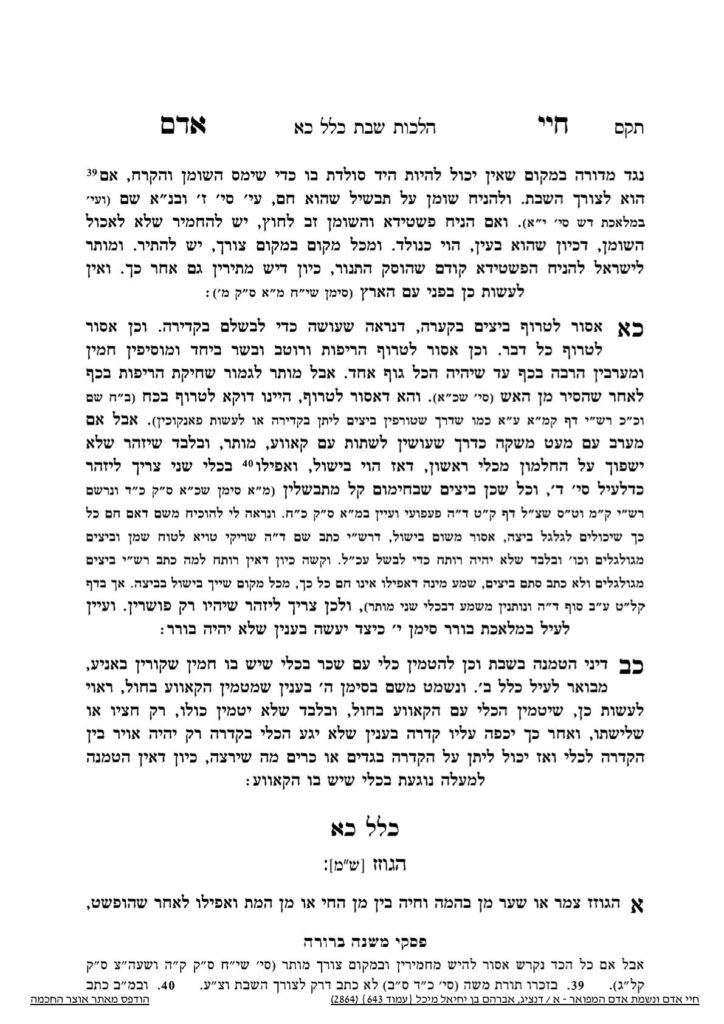We are continuing in siman 20, where we digressed to discuss the halachos of nolad.
The Mishnah Berurah discusses a person melting ice while it is in water. In that situation, any nolad which results becomes batel immediately within the water. His question is whether one should be concerned for molid, due to the active melting taking place, or whether one does not need to be concerned for molid when the product is not discernable. He brings machmirim and matirim, and does not conclude either way.
However, in siman 318, Shaar Hatziyun 146, he discusses placing congealed fat on hot meat. The fat is absorbed immediately as it melts, and he writes that it is muttar. Nevertheless, he adds that some are machmir, and therefore it is tov to be machmir.
This psak raises the question about making tea or coffee, where, by dissolving the ingredients in the hot water, one is similarly performing molid. (When a person takes liquid honey and stirs it, it does not fall into this question, since both the honey and water are liquids. However, crystallized honey would fall into this question as well.) It is clear that the minhag is to be meikil, and the question is, according to the Mishnah Berurah, how it is possible to be meikil.
There are multiple answers given to this question. One answer is that the sugar does not convert into a liquid, but breaks down into miniscule pieces. Ice, on the other hand, melts into a liquid. Another approach is that the ingredients in coffee are not actively melted, but stirring increases their exposure to the water, which, in turn, melts the ingredients. Some suggest that since these items are generally not consumed alone, but only in this state, the concept of molid does not apply, because molid implies transforming from one use to another, and over here, there was never a previous use. Either way, the minhag is to be meikil.
The Mishnah Berurah points out that if one is washing their hands with water which has some ice chips in it, rubbing one’s hands would be considered molid, and one should be machmir.
Based on the sevara that one can be meikil on molid when the melted product is not discernable, if a person would melt something in water which is a different color than the water, it is arguably discernable, and it should be a problem to stir it. An example would be orange juice concentrate, which was frozen concentrate that would be melted into water. It is harder to say that the change is not discernable in that situation, and there is more of an argument that one should be machmir.
Breaking apart frozen ice is muttar, since the person’s goal is not to melt the ice, but just to break it up. If one needs to add a little water to help break it apart, it is also muttar, since melting the ice is still not one’s goal. Pouring hot water directly onto the ice would be a problem. Similarly, some suggest that pouring hot water directly onto instant coffee would be a problem, and one should be machmir not to do so.
The poskim discuss the ice which develops on the side of a freezer or air conditioning unit, and conclude that it is considered nolad, and one cannot remove it on Shabbos.
Regarding making seltzer on Shabbos, the SodaStream machine is a mechanical device which infuses carbon dioxide from the canister into the water. Some poskim consider it molid but many poskim are meikil.
Regarding making ice cubes, the Tchebiner Rav famously held it is molid and assur. Although many poskim disagree, due to the stature of the Tchebiner Rav, those poskim are not willing to be meikil unless one has a pressing reason to be meikil.
Summary
- The minhag is to be meikil when dissolving solids into liquids, such as when making coffee. However, if the product is discernible, such as when it is a different color, one should be machmir.
- However, it is better not to melt ice in the water, or melt fat onto meat even if it is not discernable.
- There is no issue of using water to help break apart ice. However, directly pouring hot water onto the ice would be an issue of molid. Similarly, one should refrain from pouring hot water directly onto coffee or tea.
- Ice which develops on the side of the freezer or air conditioning unit is considered nolad.
- Many poskim are matir making seltzer on Shabbos.
- Although many poskim are matir making ice cubes on Shabbos, the minhag is to refrain from doing so unless one has a compelling reason.



